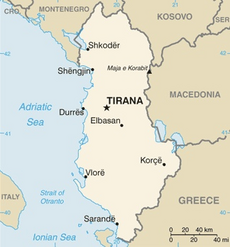United Nations Security Council Resolution 1101
| UN Security Council Resolution 1101 | ||
|---|---|---|
 Albania | ||
| Date | 28 March 1997 | |
| Meeting no. | 3,758 | |
| Code | S/RES/1101 (Document) | |
| Subject | The situation in Albania | |
Voting summary |
| |
| Result | Adopted | |
| Security Council composition | ||
Permanent members | ||
Non-permanent members | ||
| ||
| Part of the |
| 1997 Albanian civil unrest |
|---|
| Fighting groups |
| Gangs of 1997 |
| Massacres in 1997 |
| Tragedies of 1997 |
| Treasury thefts |
| Rescue missions |
| UN Resolutions |
| Important events |
| See also |
United Nations Security Council resolution 1101, adopted on 28 March 1997, after reiterating its concern over the situation in Albania, the council established a multinational protection force in the country to create conditions to facilitate humanitarian assistance.[1]
The security council noted that the situation in Albania, triggered by the failure of large-scale Ponzi scheme, had deteriorated, and the Organization for Security and Co-operation in Europe (OSCE) and the European Union were attempting to find a peaceful resolution to the situation. It was convinced that the situation in Albania posed a threat to the peace and security of the region, reflecting concerns by diplomats of the unrest spilling into other ethnically Albanian areas of the Balkans.[2]
The resolution, drafted by Italy, condemned the outbreak of violence and called for an immediate cessation of hostilities. Some countries had offered to establish a temporary and limited multinational protection force to facilitate the delivery of humanitarian assistance and create a secure environment for international humanitarian organisations. Italy, which was particularly worried about an outflow of Albanians to Italy, as had occurred in 1991, proposed to lead the force.[3][4] The Council then authorised states in that operation (Operation Alba)[5] to conduct the operation in a neutral and impartial way and, under Chapter VII of the United Nations Charter, further directed the states to ensure the freedom of movement and security of the multinational force.[6]
It was decided that the operation would last for a period of three months, and that its cost will be borne by countries participating in it. The contributing states were requested to report to the Council every two weeks on consultations between it and the Government of Albania and to co-operate with the authorities in the country.
Resolution 1101 was adopted by 14 votes to none against, with one abstention from China, which stated that the situation was an internal affair of Albania, but, given Albania's request for assistance, did not veto the resolution.[1]
See also
- 1997 rebellion in Albania
- List of United Nations Security Council Resolutions 1101 to 1200 (1997–1998)
- Operation Libelle
- Operation Silver Wake
References
- ^ a b "Security Council welcomes establishment of multinational protection force in Albania". United Nations. 28 March 1997.
- ^ Lewis, Paul (28 March 1997). "U.N. Backs Sending Troops To Restore Order in Albania". The New York Times.
- ^ Abrahams, Fred C. (2015). Modern Albania: From Dictatorship to Democracy. New York: NYU Press. p. 86. ISBN 978-0-8147-0511-7.
- ^ Alì, Maurizio (2003). L'attività di peacekeeping della Forza Multinazionale di Protezione in Albania. Rome, Italy: Facoltà di Scienze Politiche - Università Roma Tre.
- ^ Kritsiotis, Dino (1999). "Security Council Resolution 1101 (1997) and the Multinational Protection Force of Operation Alba in Albania". Leiden Journal of International Law. 12 (3). Cambridge University Press: 511–547. doi:10.1017/S0922156599000266.
- ^ Pettifer, James; Vickers, Miranda (2007). The Albanian question: reshaping the Balkans. I.B.Tauris. p. 73. ISBN 978-1-86064-974-5.
External links
 Works related to United Nations Security Council Resolution 1101 at Wikisource
Works related to United Nations Security Council Resolution 1101 at Wikisource- Text of the Resolution at undocs.org
